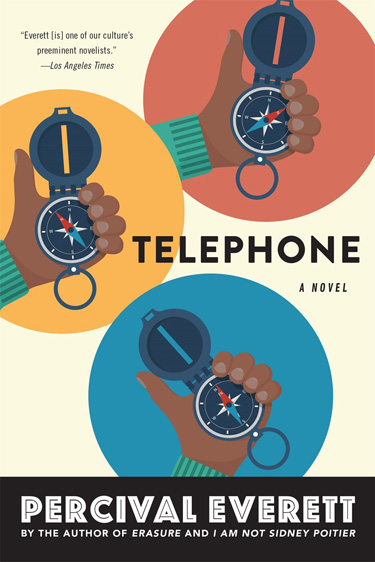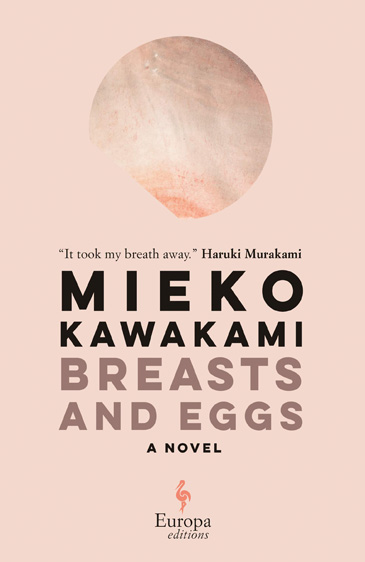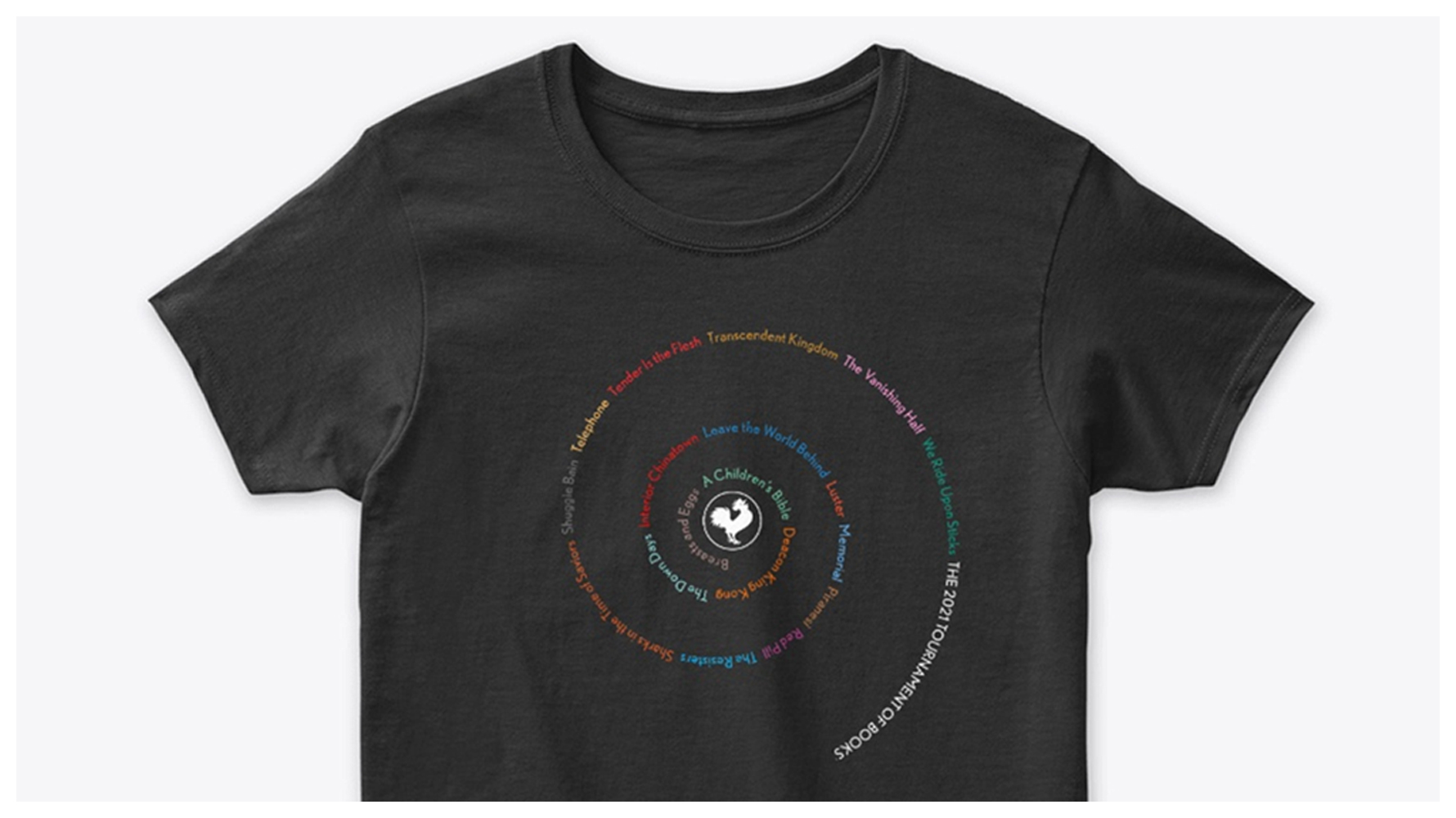-
March 23, 2021
Quarterfinals
-
Percival Everett
4Telephone
v.
3Breasts and EggsMieko Kawakami
-
Judged by
BW Kipnis
I’m interested in what a book is trying to accomplish, the tools employed in achieving its mission, and the marriage made between these things. Not that every book seeks to answer a big question or examine triggering themes on the granular level, but if I’m going to commit my time, I sure hope it does. I’ve survived some of the canon gentlemen. I’ve suffered outdated language, syntax, classism, racism, sexism. And as a result I look to a book to bring perspective, context-driven conflict, and inclusion of people whose lives and locales are different than my own.
Some time ago I read a feature on Telephone and how the author had experimented with the work’s conclusion. Discussion included how Telephone, like the childhood game, offers unpredictable endings at the work’s conclusion. Simply put, there are three different endings for the story. SPOILERS! Though how can you spoil a book when no two, let alone three people are guaranteed to read the same book. SO, NO SPOILERS!
Zach Wells narrates a tale during which he seeks to escape from his boring professor job, a wife he’s incompatible with, and their terminally ill teenage daughter. To escape his pain, Wells poses as a geologist and follows a series of notes hidden in clothing he’s purchased from eBay. These notes lead Wells to discover a trafficking scheme involving women from Mexico. Wells escapes the reality of his home life by crafting a rescue mission for disappeared Mexican women. In doing so he keeps revving in neutral within the painful areas of hearth and home.
Telephone wanders into odd places which can include caves and mounds with fossilized animal remains. For me, the seeming randomness in this technique unlocked cognitive drawers and encouraged me to suspend preconception about what Telephone was working toward in its narration. With some frequency, I departed reading and looked into definitions and translations of the novel’s inserted bits and pieces, hoping they were some sort of clue or code. In some ways they were and others they weren’t.
I enjoy a campus novel and Telephone brought me to a California campus as well as getaways to New Mexico, Mexico, and Paris. These setting descriptions were brief and spectacular. Telephone traveled to these settings for combinations of work and escapism. Like the main character, if I was faced with telling my child that they were plagued with a rare illness that will render them a vegetable, I too would endeavor to make every last minute matter while life spirals out of control. I’d get to that bucket list of unexplored places—and when the bucket list offers no respite or joy, Telephone moves its characters strategically, and each setting relocation reveals how Wells’s backstory impacts his present as he struggles to enact a positive outcome. Is Wells successful? You might have to read three books to find out, and after you do, let me know if it works out or even matters at that point.
With respect to representation and women in Telephone, I get a little rumpled. In this book women are portrayed as prey, bad mothers, good caregivers, promiscuous daddy-seeking coeds, failed professors, oddballs living off the grid, or naive and sickly. What got me was how women were portrayed negatively when they exerted their sense of feminism unapologetically. Using the representation, the women that Wells was most passionate toward were both women he didn’t know and in a state of victimhood. An example:
Hundreds of women have no face. Guadalupe de la Rosa. Names. Name. Maria Najera. It was so uncomplicated, safe, simple to talk about numbers in El Paso, a world away. Nobody misses five hundred people. Nobody misses one hundred people. In Juárez, it was one. One daughter. One friend. One face. One name.
Telephone is a sustainable read once you wipe off the tarnish on female archetypes, give yourself permission to let go of a predictable ending, and be entertained by enriching asides. It immersed me in the escapism of Zach Wells. It connected me to the desperation a parent experiences in facing losing their child. Telephone unearths this kind of pain, offers diversion, brief respite, and no closure because can one ever recover from the loss of their child?
There’s a full range of Note Books and related stationery products at fieldnotesbrand.com. Field Notes is proud to once again be a sponsor of the Tournament of Books.
Mieko Kawakami’s Breasts and Eggs offers exploration of women, fertility considerations, oppression, sexuality, donor children, complex relationships, mortality struggles, the changing nature of language, the expansive universe, and the insignificance of time. Breasts and Eggs is a quiet book that cut slowly into me with a serrated edge.
The novel orchestrates a deep dive into what it means to be Japanese, single, female, and desiring to bear in a society that restricts single or queer women from doing so. Breasts and Eggs employs strong contrast between its characters. Natsuko is a writer coming to terms with wanting a child. Yuriko, a donor child, informs and challenges the perspective of Natsuko, who is juggling fertility ethics with individual desire while processing a decision to become a single parent.
It’s really simple, I promise. Why is it that people think this is okay? Why do people see no harm in having children? They do it with smiles on their faces, as if it’s not an act of violence. You force this other being into the world, this other being that never asked to be born. You do this absurd thing because that’s what you want for yourself, and that doesn’t make any sense.
This statement becomes a rabbit hole sending Natsuko deep within her unconscious memories and feelings about having a failed father and absent mother. Additionally, Natsuko discovers her individuation from her grandmother (also parent), who dies before Natsuko achieves a successful career. All of this leads to a most uncomfortable discovery for Natsuko, that she doesn’t enjoy sexual intimacy or seek an emotional partner. She simply wishes to meet and nurture her unborn child.
There are perspectives galore in Breasts and Eggs. The relationship dynamics are intricately interconnected and not a single one is insignificant. This leads me to what makes a work excellent. It asks me to stay, perhaps to read again, so I can learn and discern further. There’s a big however here, though. Breasts and Eggs is written by a Japanese woman and is translated by two American white men. There were times I asked myself, “Is this something she wrote or intended?” When it comes to translation there’s a delicate dance, and in some places I couldn’t shake the feeling that editorial discretion was weighted toward the translators.
Well the guy’s got his family’s house. That means no rent. Plus, it isn’t much, but his parents get a bit of pension money, and this guy’s a pipefitter. So that’s honest work right there. I guess she had nowhere else to go and was kinda giving him these puppy dog eyes, like she wanted to come back, you know? So he basically said, you can come back, as long as you look after the house and take care of my parent, however long they live, whatever they need, and I mean whatever they need.
For me this passage felt like two guys telling each other a story; the tone and quality felt starkly different than most of the book. It was rushed, terse, informal, and if it wasn’t the influence of the translator, it felt like an awkward experiment. Another example of translator visibility is seen in the use of “tchotchke,” which to me felt glaringly out of context and reminded me I was reading fiction:
The prizes were things like a ten-song pass for karaoke or a bottomless cup coupon, or a number that won you some useless tchotchke.
Part one in Breasts and Eggs is gauzy and sleepy, as represented by two generations of women struggling with the consequences of their changing bodies—periods, implants, and all. The second half of the book is vibrant, emotional, and cathartic. Natsuko becomes pregnant and as her body fills with new life and changes, she experiences life more fully. Natsuko becomes more connected to her body and experiences deeper emotions new to her. The moments during the birth of her child exemplify the beautiful fullness in Natsuko’s evolution.
My head and body filled with blinding light, inside of which—I saw something expanding. Like a nebula, breathing without a sound, millions of years away. Astral mist and stars spun from the total darkness twinkling in every color of the rainbow breathing silently. I opened my eyes wide and watched the haze, the colors breathing softly through the tears. I watched the light. Eyes wide open. I reached out and tried to touch its brilliance. Something was crying.
Both books are well populated with characters, some more complex than others. Both were expansive and playful with language and the use of interesting cognitive spaces—dreams, ponderings, daydreams. One looked more closely at how a culture and time dishes challenges to groups of people, and how people challenge back. One book pushes catharsis to a greater extreme. One book looks at women as failures, victims, and men as saviors and contenders, while the other sees women as survivors, determiners, innovators, and men as partners. I learned small things with one and big things with the other, and this is why I chose Breasts and Eggs.
Match Commentary
By Kevin Guilfoile & John Warner
Kevin Guilfoile: Judge Kipnis more than upholds the ToB’s tradition of terrific essays from our Reader Judges, John. Clearly written, cogently reasoned. An A+ all around.
As much as I loved Telephone, I can’t really defend it against Judge Kipnis’s critique. It’s a book that checks a lot of familiar boxes. It’s a campus novel. It’s a classic example of the WMFUN (or in this case, maybe a “Middle-Aged Male Fuck-Up Novel”). It creates tension by putting, in more than one instance, women in peril. It also belongs to an essential mashup of the WMFUN and the Woman in Peril novel, in which the man sets off on a quest to save the woman, but is really trying to save himself (I believe I even published one of those).
You know what, though? It checked all those familiar boxes in a very satisfying way for me. That’s just the skills of a great novelist, working you over as you read.
John Warner: Different lives, different lenses lead to different experiences with a text, which is why the ToB is endlessly fascinating, and how, like you, I can agree with every word of Judge Kipnis’s critique and yet not deny the effect the novel had on me.
Thinking about how those different lenses affect the reading experience struck me especially hard while reading Breasts and Eggs because at the same time I was reading the novel, I was also reading Craft in the Real World: Rethinking Fiction Writing and Workshopping by Matthew Salesses, which at its heart is a challenge to the modes of thinking and discussion that dominate the American creative writing workshop, a culture of which I am well-familiar and have long been troubled by, though never had the knowledge or insight to articulate the precise nature of my troubles.
Salesses, on the other hand, brings a full array of critiques, arguing that “craft,” which the dominant ethos of the traditional workshop insists is neutral and objective, is anything but, and our notions of craft are significantly influenced by the culturally dominant population. Craft cannot be separated from culture, so to talk about it as a neutral, even perfectable thing, is to dodge harder and more interesting questions about how we read and respond to texts, and which texts are elevated in the culture. You get one guess about which culture dominates our notions of “craft” in American literary fiction.
I raise this here because as I was reading Breasts and Eggs, I initially questioned the “craft” of including diary passages from Natsuko’s niece in the opening section. They felt (to me) out of place, and not contextualized. I was puzzling over the use of the device from a craft perspective rooted in the dominant perspective, a perspective that Mieko Kawakami does not share.
In Craft in the Real World, Salesses discusses different traditions of storytelling in different cultures and how the “skill” of these stories cannot be divorced from the culture in which they were created. My judgment of Breasts and Eggs as potentially faulty for craft reasons—rooted in a culture divorced from the text—was faulty at its conception.
The unplanned but timely intervention of Salesses’s reminder allowed me to let go of whatever subconscious expectations I had around structure and story as I read Breasts and Eggs and give myself over to the whole thing as it was, which resulted in a much more powerful reading experience.
Kevin: I agree with all of that, but the kind of reading you describe gives the writer more benefit of the doubt than I think a lot of readers allow. Sometimes I feel like every reader now fashions themselves as a critic, and resists the generosity it takes to just turn themselves over to the author. I can catch that wave sometimes, but if a book rubs up against any of my peeves or biases or petty dislikes, it’s hard.
Speaking of my weaknesses as a reader, when I take on books in translation, I am frequently distracted by the kinds of questions Judge Kipnis raises. In one of those diary entries you mentioned, Midoriko makes an observation from her health class that it’s odd that “menstruation” has the word “men” in it, eventually discovering that it actually comes from a Latin root for “month,” and I paused for a long time to wonder if that wordplay works exactly the same way in Japanese, and how unlikely that seemed, and maybe that particular turn of phrase is a substitution for some other Japanese language pun, and then I wondered what that might have been, and then I was trying to remember the name of the guy in my college dorm who majored in Japanese and whether I was friends with him on Facebook, and it took me about 15 minutes to read 50 words. It’s possible this is a brilliant bit of translating, but it happened to me again and again as I read Breasts and Eggs. Not a fault of the novel or the translation, I don’t think, just the curiosity (and, sometimes, to your point, lack of generosity) with which I sometimes read.
Kawakami’s insights on womanhood and motherhood (and also personhood) are fascinating and delightful, but that brings us back to Judge Kipnis’s observation about the male translators. Maybe they did a fantastic job. But as a white male who lives in the West, this book was always going to be an exercise in empathy for me, and I couldn’t stop asking myself all this stuff. Which didn’t necessarily detract from my enjoyment of the novel—it’s terrific—but there was a lot of self-generated interference here. It’s up to me to learn how to tune that out as a reader.
As always, we move closer to the Zombie Round, which, if it were held today, would still include Piranesi and The Vanishing Half—I can’t remember a year in which there was so little movement in the Zombie picks. On a personal note, I’m sad to be saying goodbye to Telephone. I think it’s actually the first Everett I’ve read (despite the fact that you, John, have been singing his praises for many years), and I’m excited to explore his back catalog this year.
New 2021 Tournament of Books merch is now available at the TMN Store. As a reminder, Sustaining Members receive 50 percent off everything in our store. To find out why we’re asking for your support and how you can become a Sustaining Member, please visit our Membership page. Thank you.
Welcome to the Commentariat
Population: You
To keep our comments section as inclusive as possible for the book-loving public, please follow the guidelines below. We reserve the right to delete inappropriate or abusive comments, such as ad hominem attacks. We ban users who repeatedly post inappropriate comments.
- Criticize ideas, not people. Divisiveness can be a result of debates over things we truly care about; err on the side of being generous. Let’s talk and debate and gnash our book-chewing teeth with love and respect for the Rooster community, judges, authors, commentators, and commenters alike.
- If you’re uninterested in a line of discussion from an individual user, you can privately block them within Disqus to hide their comments (though they’ll still see your posts).
- While it’s not required, you can use the Disqus <spoiler> tag to hide book details that may spoil the reading experience for others, e.g., “<spoiler>Dumbledore dies.<spoiler>”
- We all feel passionately about fiction, but “you’re an idiot if you loved/hated this book that I hated/loved” isn't an argument—it’s just rude. Take a breath.




